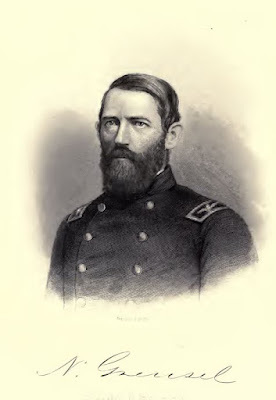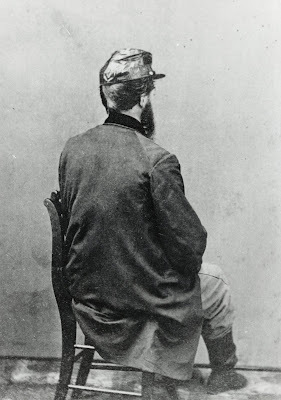Rain Falling Fast and Mud Deep: A Tullahoma Campaign Journal
Sergeant French Brownlee of the 36th Illinois never explains how he kept his journal during the rain-soaked Tullahoma Campaign in June-July 1863, but one gets the sense of the ebullient spirits of his regiment in the midst of a miserably uncomfortable march.
On June 27th, the regiment marched about 20 miles "but were kept on our feet for 15 hours. Part of the time, the sun shone hot and others the rain fell in copious showers. We camped for the night in an orchard. The 36th boys came into camp singing “We are going home to die no more.” A few days later while crossing the a ford of the Elk River, Brownlee observed "the current was rapid with water to the armpits with cartridge boxes on the end of our rifles. The boys halloed and shouted “This is all for the old flag.”
Sergeant Brownlee’s journal entriesconcerning the Tullahoma campaign first saw publication in the July 31, 1863,edition of the Monmouth Atlas published in Monmouth, Illinois. Duringthis campaign, the 36th Illinois formed part of the First Brigade (GeneralWilliam H. Lytle) of General Phil Sheridan’s division of the 20th ArmyCorps. Sergeant Brownlee would not survive the war, succumbing to disease atChattanooga, Tennessee Christmas Day, 1863.
 The constant rainy weather was a key element that marked the Tullahoma Campaign and no doubt it proved a miserable experience for the soldiers of both armies who waged war in the midst of it. Federal soldiers often would use their rubber gum blanket as a rain poncho as Si and Shorty are doing in the image above. However, their boots would become saturated and the damp would soon get to their feet, making each step a painful exercise. Drying one's socks at the end of the day was an important part of soldiers taking care of themselves.
The constant rainy weather was a key element that marked the Tullahoma Campaign and no doubt it proved a miserable experience for the soldiers of both armies who waged war in the midst of it. Federal soldiers often would use their rubber gum blanket as a rain poncho as Si and Shorty are doing in the image above. However, their boots would become saturated and the damp would soon get to their feet, making each step a painful exercise. Drying one's socks at the end of the day was an important part of soldiers taking care of themselves. Our division marched on the 24thof June, a portion of our part of labor in the forward movement of the Army ofthe Cumberland. We took the Shelbyville Pike, at first dusty, but soon theheavy rain converted the dust into mud. Marching seven miles, we halted inclose proximity to heavy skirmishing and an artillery duel between Granger’scorps on our sides and the Confeds at Liberty Gap. Being rear guards, we took nopart in the affair. But after remaining a few hours, we filed left and pursuedour march for the Manchester Pike, the rain falling fast and the mud increasingin depth. We camped in a wet bottom, using pine twigs to keep out of the mud duringour slumbers and cedar rails for fuel.
June25: We remainedat the same place, Brannan’s division passing amidst a very heavy rain.
June26: Resuming ourmarch this morning with the rain pouring down in torrents, we marched threemiles and had a pretty hillside for a camp and straw to sleep on.
June27: Our march was resumed early in the morning,but such roads! Wagons fast in the mud, wagons upset, roads blocked. Theinfantry marched as we had done on the previous days, through fields, yards,and gardens without regard to persons. Five miles brought us to the ManchesterPike. Here we got in sight of the pontoon train and were admonished that “bigthings were on hand.” Two or three miles brought us to Hoover’s Gap, a strongposition. We were greatly surprised that the Rebs made such slight resistancewhere the natural advantages were so great.
Filing right during a heavy rain, weleft the pike, taking a dirt road for purposes to us unknown. This afternoon,for the first time in Tennessee, a lady cheered by waving her handkerchief aswe marched by, one of my comrades remarking “You protect my property and I willshake the flag.”
We arrived at Fairfield in theafternoon [Page is indistinct] a skirmish took place here, the second brigade ofour division participating. The 36th Illinois loaded at will and byfiling left was thrown in the advance with the right company deployed asskirmishers, but nary a gun was fired and nary a Reb spied.
Resuming our march, we passed throughthe first clover field we had noticed in Tennessee, filled with swine, horses,and cattle proving conclusively that the country is adapted to clover. This day’slabor was severe, many soldiers falling out of the ranks through fatigue. Wemarched 18-20 miles but were kept on our feet for 15 hours. Part of the time,the sun shone hot and others the rain fell in copious showers. We camped forthe night in an orchard. The 36th boys came into camp singing “Weare going home to die no more.” But why recite our marches to the conservatives?Not a dollar of their money can we get of their money to assist in relievingour sick and wounded soldiers.
I noticed two ladies crying thisafternoon as we marched along the road and supposed they had lost or relativeor friend. But the next morning I ascertained it was only a couple of horses. Isuppose these ladies approximate the feelings and opinions of Northernconservatives who have no tears to shed for their distracted country.
 Colonel Nicholas Greusel, 36th Illinois
Colonel Nicholas Greusel, 36th Illinois
June28: A march ofseven miles brought is to Manchester, rain falling fast, mud deep, the roadsalmost impassable. We crossed two branches of the Duck River, the smallestbranch spanned by a bridge 210 feet in length. Two companies of Rebels had beenleft to guard and destroy these bridges, but by a flank movement, thesecompanies were taken in out of the wet and the bridges saved. Manchester is thecounty seat of Coffee County, containing an old courthouse, a great manydecayed buildings, with but few neat residences. Our division, from this place,occupied the advance.
June 29: Leaving amidst the heaviest rain,continuing the greater part of the afternoon, we marched seven miles and campedin a dense piece of timber. In the evening there was sharp firing by thepickets and the 36th took a position on the picket line.
June30: The last ofJune we lay in camp. Our thoughts went back to the Stones River engagement. Thefact that six months ago today the regiment lost 45 killed and 163 wounded. Onthat fatal morning [Page indistinct] sincere Christian and honest citizen,Sergeant McClung fell, a sacrifice to his country. We were sad. Tullahoma theenemy may hold but seven miles from us and the solemn thought that some of ournumber will fall and who or how many is known only to God reverted through ourminds.
We thought of a letter that a youngsergeant of Co. C received shortly after the Stones River battle from aresident favoring a disgraceful peace and calling the soldiers home, givingthat sergeant no encouragement for supping on grapeshot the evening of the 30thstanding by the side of a tree for six hours on picket as a rest through thenight; breakfasting on Minie balls administered by a brigade of Rebels on the31st of December 1862.
But while we were musing thus, we rememberedthat our patriotic governor, the soldier’s friend, had prorogued therepresentatives of this class of citizens just as they were meditatingmischievous things in their minds. All honor to the gallant Yates.
 Orderly Sgt. Orison Smith
Orderly Sgt. Orison SmithCo. E, 36th Illinois
July1: About 11 o’clock,we received orders to march. We had proceeded but a short distance when we receivedintelligence that Tullahoma was evacuated. The day was hot and sultry, the roadnarrow, timber on each side. The rays of the sun were piercing. We were alldeceived in Tullahoma. The fortifications were strong- more rifle pits than weexpected to see and hundreds of acres of timber felled to obstruct our advance.We were much surprised to find such a small place and poor site. The onlyredeemable feature was a fine spring of water and a nice creek to bathe in.
July2: Reveille at 3in the morning. We soon started in pursuit of Bragg but were brought to a haltat Elk River, the bridge being burnt. Filing left, we took a meandering routethree miles out of the way, crossing at a shallow ford by wading. The currentwas rapid with water to the armpits with cartridge boxes on the end of ourrifles. The boys halloed and shouted “This is all for the old flag.” We all gotover safe. Our regiment was on picket, our company deployed as skirmishers, butno enemy was discovered. Having been put on half rations, many of the boys hadnothing to eat.
July 3: Theday found us early on the march in pursuit of the retreating foe. Five miles broughtus in view of Winchester and the enemy in line of battle. One company of the 21stMichigan and our company were deployed as skirmishers. We deployed through oneof the largest dewberry patches I ever viewed. The boys were hungry; the berrieslarge and thick, delicious, and tempting. But there is a prospect for Minieballs being hurled at us. [Page indistinct] merely imitating the off side ox inthe prairie team, bend down without stopping, and get some of the largestberries.
Fearing our skirmish line, the Rebelsmade a hasty retreat, thus causing us to lose a shot at the Rebs and thedewberries. Crossing a large stream, we soon took possession of Winchester at a“right shoulder shift, arms.” This is a pretty place. One of the ladiesremarked as we passed through town, “Oh, the poor Confederate troops, how theywill suffer!” We made a short halt- the rain falling fast, but soon resumed ourmarch. The Rebels made a stand a short distance from town on the banks of alarge creek. But we soon dislodged them and a few of the 39thIndiana were wounded.
Plunging through the stream andascending the banks, a painful sight presented itself to our view. A boy of 16had been shot by one of our sharpshooters of the 21st Michigan at adistance of 600 yards. The parents were Union people. The aged mother exclaimedwith tears running down her cheeks, “My son was always in for the Union. Hislast words were ‘hurrah for the Union!” Pursuing our way, we arrived at Cowan’sStation and camped on the ground occupied by Bragg’s forces in the forenoon.Bragg, by burning bridges and felling timber in connection with the heavyrains, made further pursuit for the present impractical.
The health of the boys is good. Ourcompany left Murfreesboro with 43 and of these, all but one are fit for duty. Wehave been down the railroad to Anderson’s Station 15 miles distant. Therailroad is but little damaged. I had the pleasure of performing picket dutyone night in Alabama. The mosquitoes made free use of their bills for the firsttime during my enlistment.
Source:
Campaigndiary from Orderly Sergeant French Brownlee, Co. B, 36th IllinoisVolunteer Infantry, Monmouth Atlas (Illinois), July 31, 1863, pg. 2
Daniel A. Masters's Blog
- Daniel A. Masters's profile
- 1 follower



